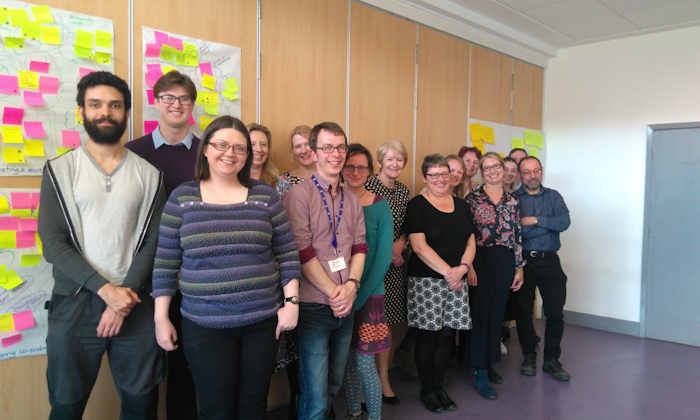President visits our public engagement champions
16 Apr 2019
Nancy hears how we tell our stories and demonstrate our impact to young and old, our neighbours, the wider world – and even our colleagues

Nancy Rothwell met our ten Public Engagement Champions, who are part of a pilot initiative to empower and develop staff and students to help deliver the University’s public engagement strategy.
The University aims to achieve the actions agreed as part of the National Co-ordinating Centre for Public Engagement’s Gold Watermark for Public Engagement, which we were awarded in November 2018.
But, Nancy recalled, our journey started at least a decade ago when the University was part of the Beacons for Public Engagement initiative, funded by the Higher Education Funding Councils, Research Councils UK and the Wellcome Trust to inspire culture change in how universities engage with the public.
Now public engagement is central to the strategic plans of Research Councils and charities such as the Wellcome Trust and Research England. All major funding bodies support public engagement initiatives and drivers, such as Research Excellence Framework impact cases, highlight the growing significance of public engagement.
Here at Manchester, we’ve moved forward too. Our new champions met Nancy fresh from a session to discuss the wider strategic role of public engagement within the University’s social responsibility agenda.
This included current thinking round “Our Future”, reviewing and sharing personal and institutional development plans and meeting two experienced engagement mentors – Andrea Winn from Manchester Museum and Tim Hudson from Cancer Research UK.
Benefits
They discussed their colleagues’ enthusiasm for public engagement and the benefits that could overcome anything holding anyone back.
Finding the time to do the administrative work associated with events could be tackled by joining a group already doing public engagement and colleagues should also be given “licence to fail” – be allowed to take risks, do something different and see what happens.
“There’s an obligation to tell the public what we are doing, what we’re contributing to society – and it’s fun,” Nancy explained.
There were other benefits, she said: “One of my best research projects came from a member of the public who said, ‘this sounds like a silly question’ and it wasn’t.”
Professor Sheena Cruickshank, our Academic Lead for Public Engagement, said she had found new collaborations and funding streams during her public engagement work.
It develops confidence – as Nancy said, “if you can communicate your work to a nine-year-old, you can communicate with anyone,” adding, “children can be harsh in their feedback, but adults are very appreciative so I would suggest starting with them.”
And it can bring a workplace together, not only by inspiring fascinating new collaborations between researchers but also increasing the pride we all feel for what we do. Nancy recalled that many years ago, University researchers were expected to give regular talks to secretaries and building attendants in their building. This year, the Christie Hospital gave its cleaning staff time off to take a tour of the new Proton Therapy Beam Unit so they too could talk to patients about the wonderful work being done there.
Celebration
At Manchester, we’re lucky to have the impact of several renowned cultural institutions – Manchester Museum, The Whitworth, John Rylands Library and the Jodrell Bank Observatory – as well as big names such as Professors Michael Wood, Danielle George, Brian Cox, Jeanette Winterson and most recently, Maxine Peake.
We have a lot to work with and be proud of.
Ten years on from our enthusiastic start, we are producing a celebration booklet featuring key moments and achievements in our public engagement journey and sharing stories that capture the diversity of our public engagement activities. The booklet will be available in July and will complement the launch of our new public engagement website.
As Sheena explains, "it is a privilege to be able to share our research and involve the public in our work through our public engagement. And of course it offers a chance for us to inspire and to be inspired.”
Further information
For more information on our public engagement, visit:
